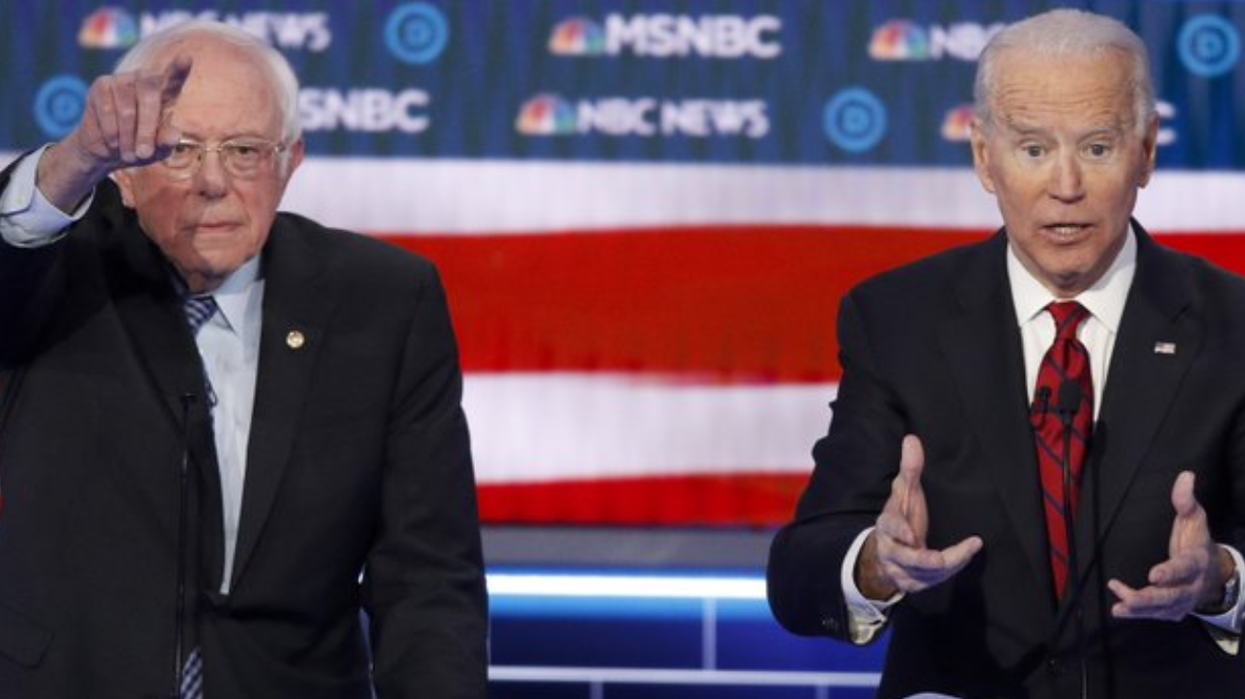Book Excerpt: The Day Bernie Backed Off From Attacking Biden
Excerpted with permission from The Fighting Soul: On The Road With Bernie Sanders, available here.
I look at September 2019 as a month where I missed something. We began with a trip to New York to do Seth Meyers’s and Dr. Oz’s shows. Why would we go on The Dr. Oz Show? For the same reason we had gone on Joe Rogan’s podcast in August: We could reach a vast audience that wasn’t paying attention to the standard political media. On Dr. Oz, Bernie could talk about Medicare for All and his own physical fitness. While at the time we believed Bernie was uncommonly healthy for his age, he was still 78. Questions would be raised related to his age, and we needed to begin building up the case that he was completely healthy and fit. It turned out to be a spectacular interview, ending with the two of them playing basketball on a makeshift court in the studio. Bernie appeared to be on top of the world.
Yet in retrospect, I should have seen Bernie growing more fatigued. After New York, with the school year starting, we did a series of rallies at colleges and universities in Iowa; this was the kickoff of our campus organizing program in the state. We would then fly to Colorado for a large rally in Denver before heading to Boulder to prep for the third debate, to take place in Houston on September 12. In Iowa, Bernie’s voice was a little hoarse. After the rally in Denver, he had completely blown it out. He sounded terrible.
One of Bernie’s few previous health problems had been a cyst on his vocal cords years before his first run for president. Now he was again experiencing problems with his voice at the worst possible moment. Elizabeth Warren had moved into second place in the polls. She, Joe Biden, and Bernie would all be on the stage together for the first time at the debate in Houston. Not only was his voice a problem, but he seemed to be getting progressively more tired.
During debate prep, the staff had a mission. Because Warren and Biden were polling at one and two, respectively, they would be at the center of the stage. Bernie would be shuffled to the side, an unusual place for him. He needed to put himself at the center of the action. If you want a crowd, pick a fight. There was general agreement among the staff that he should begin the debate with an attack on Biden. He should go after him on an assortment of issues, from his previous advocacy for Social Security cuts, to his vote for the Iraq War, to trade treaties he had backed that had cost our country millions of jobs.
We pitched the strategy to Bernie throughout the day. It was reinforced by two additional staff members who showed up at debate prep to deliver a memo making this point. He seemed to agree with it. Campaign adviser Jeff Weaver wrote an opening statement that we all signed onto. Bernie made some alterations and practiced it several times. While he was behind it, he seemed a bit hesitant. Bernie was very particular about one thing: that the attack not be personal. It would be about policy. At the same time, he knew that he needed to do something to take command of the stage.
We arrived in Houston with Bernie still saying he was sticking to the plan, but something was off. With campaign manager Faiz Shakir, myself, and Jane Sanders in the greenroom, Bernie practiced his opening, jotting it down on his ever-present yellow legal pad. What we saw as Biden’s prior missteps would be framed not just as policy disputes, but as an argument about electability. Bernie would make the case that Biden’s repeated errors in judgment over a long career made him a weak candidate to take on Donald Trump in the general election.
In the greenroom, Bernie read the statement with a perfect delivery. Jane listened carefully, clearly sensed his discomfort, and said, “Talk about your issues, don’t attack Joe.” Jane’s words were all he needed. He would not take the road he never wanted to travel down in the first place. This was not a candidate’s spouse making a political judgment. It was Jane performing one of her most important duties on the campaign—making sure Bernie stayed true to himself.
After Jane left the greenroom to take her seat in the audience, Faiz and I, committed to the strategy we had agreed to in debate prep, encouraged Bernie to go onstage and deliver the statement as prepared. There was even more discomfort in his voice. We made one last attempt to pump him up. At the prior debate, he had left the greenroom dancing and ready for a brawl. He left the green room in Houston with a burden on his shoulders. When it came time for his opening statement, I turned to Faiz and said, “Is he going to do it?”
“I don’t know.”
Instead of the practiced opening, Bernie delivered his Bernifesto, the list of the policies he supports: Medicare for All, College for All, and a Green New Deal. Faiz and I looked at each other. We didn’t need to speak. We could tell what the other was thinking: fuck.
While Bernie performed well enough for the rest of the debate, much of the staff saw it as a wasted opportunity. What made us nervous was that Bernie had seemed to relish counterpunching against John Delaney and other moderate Democrats during the July debate, but he now seemed very hesitant to attack Joe Biden.
Excerpted from The Fighting Soul: On the Road with Bernie Sanders by Ari Rabin-Havt. Copyright © 2022 by Ari Rabin-Havt. Used with permission of the publisher, Liveright Publishing Corporation, a division of W. W. Norton & Company, Inc. All rights reserved.



